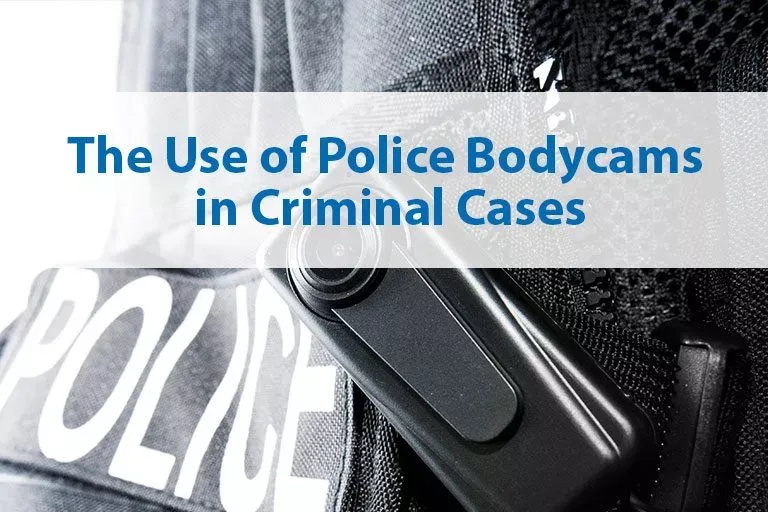As technology advances every single day, the tools available in US criminal cases continue evolving too. One of the best innovations in the legal system recently is the implementation of bodycams in many police departments nationwide.
As an experienced Rhode Island criminal defense attorney, I wholly approve of these cameras and using the footage as evidence in criminal cases. Doing so makes it much simpler to get a fair outcome for everyone involved.
That’s why I put together this overview of the use of bodycams in criminal cases across the USA and Rhode Island. Keep reading to learn about why this technology is great news for your case and for society as a whole.
How Bodycams are Used in Criminal Cases
It’s no secret that video footage has played a huge role in US courts over the past few decades. But today’s bodycams can capture so much more than the fuzzy footage you often see with surveillance cameras.
In the USA, a recent report found that 47% of general-purpose law enforcement agencies have started using bodycams. Here in Rhode Island, that number is much smaller—closer to 15%. Let’s take a closer look at how bodycams are used in criminal cases.
In the USA
One perfect—and tragic—example of how bodycam footage can change things in a US criminal case is the famous George Floyd case from 2020. Immediately following George Floyd’s death, the police issued a statement that Floyd died due to a “medical incident” after physically resisting arrest.
Bodycam footage disproved almost all the police’s initial statements. Without this footage being released, the violation of this man’s constitutional rights might never have been discovered. And the people responsible for those violations may never have been held accountable.
In Rhode Island
At the time of writing, there aren’t any famous Rhode Island criminal cases in which bodycam footage was essential to uncovering the truth. This is partially due to the state’s slowness to adopt this technology.
You see, since so few departments currently utilize bodycams, there aren’t many opportunities to use the footage in a meaningful way.
But that could all be changing soon. In October 2022, the Rhode Island legislature announced that $16 million in grants will be used to issue bodycams to police departments statewide. The new law also comes with a statewide policy which sets thorough and clear standards on how to use the cameras.
What Types of Evidence Can Bodycam Footage Provide in Criminal Cases?
Examples of the types of evidence bodycam footage can provide for criminal cases include:
- Documenting any type of police misconduct
- Proving that you, the defendant, were not behaving violently or aggressively
- Demonstrating that your rights were violated
- Capturing audio and/or video of the crime (and the true criminal) as it happens
Currently, bodycam recordings are just as admissible in court as any other kind of photo or video evidence.
Can Bodycam Footage Be Used to Challenge the Prosecution’s Evidence in Court?
Yes, bodycam footage can absolutely be used to challenge the prosecution’s evidence in court. It’s the unfortunate truth that police officers will often lie or exaggerate in court. In fact, one study in Chicago found that 20% of the time, police officers will do so on the witness stand.
Bodycam footage allows a criminal defense attorney, the judge, and the jury to see the truth—without any exaggerations or lies of omission. If the prosecution says one thing or supposedly has evidence of a crime and the footage shows otherwise, resolving the case becomes much easier.
DUI cases are a great example of how bodycam footage can simplify things. Because the camera records everything—even the moment the officer walks up to a vehicle—the “he said, she said” element is no longer an issue in court.
Let’s say the prosecution states that an officer took a specific action because of something you said or did. But in the footage, it’s clear that this officer’s actions were unwarranted and your rights were violated. The prosecution’s evidence has now been challenged thanks to bodycam footage.
How Can Bodycams Worn by Police Officers Help Criminal Defense Lawyers in Court?
Bodycams worn by police officers help criminal defense lawyers in court because we simply play the video, then the judge and/or jury can easily see what really happened. Prosecutors, police officers, defense attorneys, and society as a whole should continue embracing this technology.
All in all, recent research shows that bodycams can benefit the general public, law enforcement officials themselves, and the outcome of your own criminal case. Based on my own experience as a Rhode Island criminal defense attorney, I couldn’t agree more.
My legal team and I 100% support the idea of using bodycams universally.
With this video footage, the legal system no longer has to rely on the police officer’s word or their memory being perfect. The judge, jury, and anyone else involved can see exactly what happened. And your community can rest easy with a greater sense of safety, knowing the police’s actions are being taped. It’s a win for police officers too, since it protects them from false allegations of illegal use of force.
One recent study even found that with the addition of bodycams, complaints against law enforcement officials dropped by 17%. Plus, use of both non-lethal and lethal force decreased by nearly 10%.
Even though resolving your case becomes much easier with bodycam footage, Rhode Island is just now beginning to adopt this fantastic technology. If you or a loved one are facing criminal charges of any kind—and whether there’s bodycam footage of the alleged crime or not—I’m here to help.
When you work with me, Rhode Island Criminal Defense Attorney S. Joshua Macktaz, Esq., for your legal representation, I’ll be the one standing by your side in court. With my knowledge, experience, and aggressive approach to defending you, we’ll work to win the best possible outcome for your case.
Just call me anytime, day or night, at (401) 861-1155 for your free consultation.



